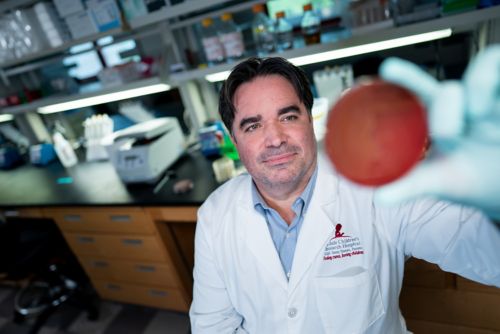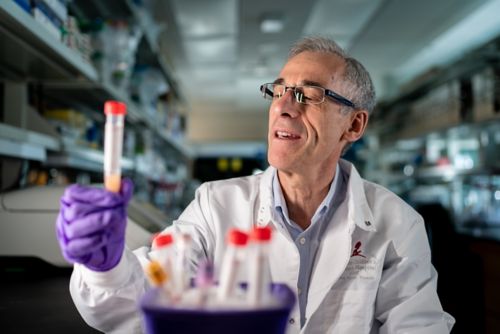St. Jude Family of Websites
Explore our cutting edge research, world-class patient care, career opportunities and more.
St. Jude Children's Research Hospital Home

- Fundraising
St. Jude Family of Websites
Explore our cutting edge research, world-class patient care, career opportunities and more.
St. Jude Children's Research Hospital Home

- Fundraising
Scientists at St. Jude have been studying pathogens that cause severe infections in children for as long as the hospital has existed.
This is because children undergoing cancer treatment have weakened immune systems and are more vulnerable to infection than their peers are. From bacteria to viruses to fungi, combatting the pathogens that bombard patients’ immune systems requires a dedicated effort. As the COVID-19 pandemic demonstrated, there are many ways to go about studying pathogens, examining both the infectious agent itself and how the host immune system responds.
To take St. Jude into the next era of infectious diseases research, two new department chairs have been recruited to tackle microbial pathogens and their associated diseases through the Department of Infectious Diseases and the newly created Department of Host-Microbe Interactions. St. Jude investigators from across the research enterprise have been appointed to these two departments, forming an all-star workforce that takes bold steps toward meeting the pathogen threat.
Each department will conduct their own research, but then feed their learnings into the other discipline, creating a virtuous cycle that will lead to better methods of discovering novel and effective strategies for treating and preventing infectious diseases in vulnerable patients at St. Jude and around the world.

St. Jude has a rich history of fundamental infection biology science. The goal is to build on that history and perform fundamental research in infection biology to understand how microbes cause disease.
Chair, Department of Host-Microbe Interactions
Focus on the fundamentals in the Department of Host-Microbe Interactions

Victor Torres, PhD, Chair of the Department of Host-Microbe Interactions, looks at a culture plate in his new St. Jude lab.
“St. Jude has a rich history of fundamental infection biology science,” said Victor Torres, PhD, Department of Host-Microbe Interactions chair. Torres brings decades of fundamental microbiology experience to St. Jude, giving him a unique vantage point to shepherd the new department’s aim. “The goal is to build on that history and perform fundamental research in infection biology to understand how microbes cause disease.”
Host-Microbe Interactions focuses on what happens at the molecular and cellular level when a pathogen challenges the immune system. With scientists from the St. Jude lineup of infectious disease and immunology experts, the department is now actively recruiting additional faculty.
“We want to bring people who are going to push the boundaries of discovery,” Torres said. “We will move the needle toward learning how microbes cause disease, how infection can be prevented, and explain disease prevalence.
“I aim to create a premier department and recruit researchers interested in infection biology and host-microbe interactions. We will create a diverse scientific portfolio that encompasses an understanding of the most important infectious diseases locally, nationally, and worldwide.”
Each scientist will help push diverse areas of research on hosts, microbes, and how they interact, all with an eye toward expanding knowledge to improve patient care.
“We want to bring precision medicine to infectious diseases,” Torres said. “To do that, we need to deploy cutting-edge tools while combining bench science with clinical samples and sophisticated multi-omics so we can unearth the secret of that delicate dance, the interaction between a microbe and its host, to unravel new vulnerabilities.”
Pathogens, patients, and prevention with the Department of Infectious Diseases

Octavio Ramilo, MD, new Department of Infectious Diseases chair, looks at a sample being kept cool by dry ice in his lab.
“Collectively, infectious diseases are the number one cause of death in children across the globe,” said Octavio Ramilo, MD, Department of Infectious Diseases chair. “Vaccines and clean water access have improved infection survival over the last century, but we still have much to do.”
“About 60% of pediatric cancer-related deaths around the world are related to infection,” Ramilo continued. “For anything involved with cancer-related infections, we need to be the top institution bringing together cutting-edge care with clinical research.”
Ramilo’s expertise in respiratory syncytial virus (RSV), a major pathogen that can be dangerous for children during the first two years of life, informs the department’s direction as Infectious Diseases focuses on understanding biology to optimize treatment strategies.
“We need to do fundamental discovery in the clinical context,” said Ramilo, “We know that early infections in life, such as RSV, shape your long-term health outcomes, but we don’t understand how.”
For Ramilo, understanding how to best treat infection goes back to understanding early immunity, examining immune function in healthy newborns and infants, and observing changes over time as children encounter pathogens or vaccination.

About 60% of pediatric cancer-related deaths around the world are related to infection . . . We need to be the top institution bringing together cutting-edge care with clinical research.
Chair, Department of Infectious Diseases
“We know that vaccines or infections can shape the infant immune response,” Ramilo said. “We could learn fundamental lessons key to developing new and more effective vaccines — preventing illness — and because the immune system is involved in everything, it could have a wide impact: how we make vaccines, immunotherapy, and even gene therapy. This work will help us design better therapies for children with cancer, as well as for previously healthy children.”
Ramilo and the Department of Infectious Diseases will leverage the long-standing reputation of St. Jude as a world leader in infectious diseases to embark on new collaborations and facilitate the launch of scientifically ambitious and logistically complex research.
Ramilo has his eye fixed on translational research, providing novel insights into the pathogenic threats patients face and how these diseases present clinically to inform the next generation of treatment approaches. Such work will also build a repertoire of knowledge on how the host immune system interacts with these pathogens, feeding back into the laboratories of Host-Microbe Interactions.
Two departments, one strategy
“We have an opportunity to leverage the fundamental research strength and expertise of St. Jude in Infectious Diseases, Host-Microbe Interactions, and even other departments to learn how to save more children,” Ramilo said.
Though each department will focus on different subfields, both are dedicated to improving survival and preventing suffering due to pathogens — and working together to do so. Together, Torres and Ramilo are leading their respective departments toward a future where the threat of pathogens can be met head-on.
“We like to tackle difficult things here at St. Jude, and we are good at making progress on issues others have deemed impossible,” Torres concluded. “That’s the challenge, and that’s why I came here. We want to transform the world by tackling one microbe at a time.”